For its size, the small town of Barry in South Wales, population 47,863, produced a notable number of high achievers. They start with the Victorian industrialist and philanthropist David Davies, whose daughters Gwendoline and Margaret donated their important fine art collection, including many famous impressionist paintings, to the National Museum of Wales in nearby Cardiff.
The list contains one of the great names in Welsh Nationalists politics, Dr Gwynfor Evans, and the Australian politician (the family moved there when she was five) Julia Gillard. Damien Green is a minister in current Coalition government (2013).
There are footballers, rugby players and cricketers, all of whom pleased their public in their day. In the arts and media the names of two men born just three years apart stand out. One, Roger Livesey, went on to star as the lead actor playing the title role, in one of the most revered of all British films, “The Life and Death of Colonel Blimp”. The Guardian film critic Derek Malcolm praises “the magnificent performance of Livesey as Blimp… It’s a great British film.”
The other, journalist Gareth Jones, who died 78 years ago today, on 11th August 1935, remains little-known by the wider public, despite making his name in the 1930s with a series of remarkable scoops which included disclosing Stalin’s state-sponsored famine in the Ukraine, and being one of the first foreign correspondents to join Hitler on the campaign trail, in 1933.
In terms of the personal bravery he showed in following his career, Jones stands apart from Barry’s other famous names, although courage is certainly a quality that can be assigned to Julia Gillard for the way she acquitted herself in the bear pit environment of Australian politics.
Livesey was born three years after Jones, in 1908. In 1942 director Michael Powell asked him to play the lead in his film about a young soldier who epitomized the dying traditions of honour and old-fashioned virtue in his personal and military life. “It stands,” wrote the critic Dave Kehr, “as very possibly the finest film ever made in Britain.”
Then we have Jones, a real life adventurer journalist who demonstrated similar virtues in his own career, with painstaking on the ground research. His own safety was under very clear threat, as he asked the difficult questions on behalf of a world drifting towards war. He paid the ultimate price for his diligent reporting when he was murdered one day short of his 30th birthday in 1935. And yet the life of this unlikely hero – the photographs giving a misleading impression of the teetotal and academic Jones as prim and staid – paradoxically has been ignored by the filmmakers.
Even now online biographies of Jones refer to him being “murdered by bandits” (Wikipedia), and it’s a conclusion I have repeated myself. However the conspiracy theory, that he was eliminated either by the Russians or the Japanese security services through their hired killers, was circulating within months of his death, as you can see for yourself here online.
Did he discover the evidence, too uncomfortable for the Japanese and perhaps their German allies, that the Japanese were planning a military coup. His mentor, former prime minister David Lloyd George, pressed for an enquiry, but even then was it being closed down by people who had the truth? Lloyd George suggested Jones died because he knew too much.
“Mr Gareth Jones…had a passion for finding out what was happening in foreign lands wherever there was trouble, and in pursuit of his investigations he shrank from no risk… I had always been afraid that he would take one risk too many. He had the almost unfailing knack of getting at things that mattered.”
Jones is chiefly, and rightly, remembered for his enormously important reporting in exposing the man-made famine in Ukraine, in a series of articles in 1933. But the pivotal scene in a hypothetical film would surely be Jones as the scoop gathering, adventurer journalist, aboard Hitler’s new airplane, on the campaign trail in Germany. In his article, for the Western Mail, he makes this supreme understatement: “If this plane were to crash, the history of the world would be different.”
It’s the subject of my monograph on this fine Welsh writer, So wise, so young – Gareth Jones, Journalist, available free here

